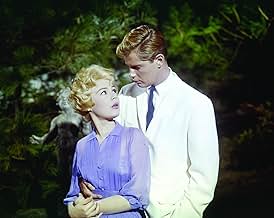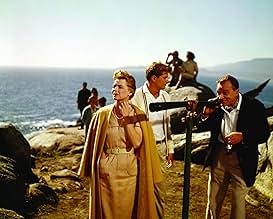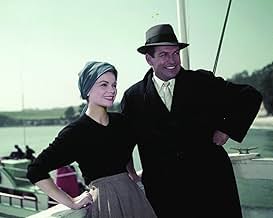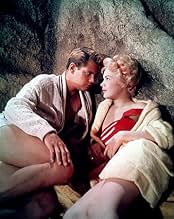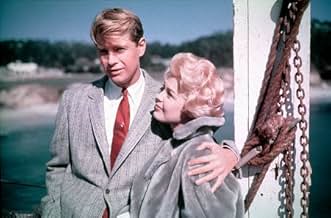Adicionar um enredo no seu idiomaA self-made businessman rekindles a romance with a former flame while their two teenage children begin a romance of their own with drastic consequences for both couples.A self-made businessman rekindles a romance with a former flame while their two teenage children begin a romance of their own with drastic consequences for both couples.A self-made businessman rekindles a romance with a former flame while their two teenage children begin a romance of their own with drastic consequences for both couples.
- Prêmios
- 2 vitórias e 3 indicações no total
- Waiting Guest at Molly's College
- (não creditado)
- Dr. Matthias
- (não creditado)
- Sheriff
- (não creditado)
- Driver
- (não creditado)
- Captain of Yacht
- (não creditado)
- Pawnbroker
- (não creditado)
- Mrs. Talbert
- (não creditado)
- Helen's Mother
- (não creditado)
- Girl in Dormitory
- (não creditado)
- Direção
- Roteiristas
- Elenco e equipe completos
- Produção, bilheteria e muito mais no IMDbPro
Avaliações em destaque
The writers and filmmakers did a great job of showing how adultery and premarital sex are NOT necessarily black & white issues. In the case of Sylvia and Ken, both have been emotionally abandoned by their selfish and detestable partners. And, in the case of Molly and Johnny, they are normal hot-blooded teens who have been thrust together by Molly's mother and her rants about the evils of sex. So, it's all very understandable...and all very, very risqué for 1959. But because the story is so well written and the production so glossy, it makes difficult moral issues and choices much more palatable--and provide for a lot to consider. It also makes for a wonderful film for young married couples to watch...sort of a morality tale about what NOT to do!
A highlight of this film is the speech Ken makes to Helen early in the film...about her many, many, many prejudices. According to IMDb, the crowd at one performance gave it a standing ovation! A very powerful scene indeed.
Overall, this film has many strong scenes, excellent acting, nice music and all the gloss a Hollywood production could have. It also has quite a bit of depth and raises many interesting issues...making it perhaps the best soap opera movie of the day. And, fortunately, while the film might seem a tad dated (such as the custody arrangements), it also is timeless with its themes.
Richard Egan and Constance Ford with their daughter Sandra Dee are returning to Pine Island, Maine where years ago before Egan became wealthy as a research chemist he was employed as a lifeguard and where he romanced one of the town beauties. Pine Island is like Kennebunkport, the private reserve of the Bush family. This is the private reserve of several old Yankee families who if they can't trace their ancestors on the Mayflower at least they go back to Puritans who might have found New England more hospitable than Restoration Great Britain.
Egan's rented out several rooms from thinning blue blood Arthur Kennedy and his wife Dorothy McGuire. It was McGuire who Egan loved and lost those many years ago.
Neither Egan and McGuire have found much happiness in their second choice for spouses. Constance Ford, a truly uptight and frigid woman from Buffalo has not kanoodled with Egan for years. You know he's good and ready. As for McGuire's marriage, Kennedy has all the airs of a patrician, but not the money any more. Did he lose it because of his alcohol problem, or is he drinking because the family fortune has gone? It's your choice.
So Egan and McGuire discover each other and Sandra Dee discovers Kennedy and McGuire's son, Troy Donahue. Because of her mother, Dee's led a sheltered life and I'm betting the isolation of Pine Isle with its very few inhabitants hasn't improved Donahue's social skills either. The two kids are sadly a textbook case for sex education.
Feeling betrayed by their parents, all of them when you come right down to it, the young people feel they have only each other. The passion multiplies exponentially.
Right up there with the human cast members in making A Summer Place a big commercial hit for Warner Brothers is Max Steiner's theme, played when Dee and Donahue are together. It's popularity on the radio and jukeboxes sold many a ticket to this film.
Egan and McGuire are also appealing in their way to discover their passions are still the same. The odd spouses out are also turning in fine performances. Arthur Kennedy who was never bad in any film he ever did is both arrogant and yet pitiable as the sad sack alcoholic. The villain of A Summer Place is really Ford, she's made life hell for Egan and Dee. Yet you wonder throughout the film what must have she been like back in the day for Egan to fall for her in the first place and what changed her.
It's Eisenhower era America and the story is dated somewhat, but not all that much. I can see A Summer Place being a candidate for a remake, who would you cast in a remake among today's players?
I'm sure she got static for her portrayal when she visited the supermarket or whatever in her daily life.
I'm not kidding, Bruno Ganz' portrayal of Adolf Hitler in Der Untergang/Downfall was more sympathetic and likable than Constance's portrayal of Helen.
It's all very lush looking in magnificent color, a Pine Island resort in Maine photographed principally in Northern California along the Monterey coast. Whenever emotions soar, whether quiet emotions or full throttled ones, Max Steiner's music is there ready to lend a helping hand.
As the teen-aged lovers, SANDRA DEE and TROY DONAHUE are just as photogenic as the landscapes they're photographed against, especially when the color cameras turn their close inspection on the two bronzed, blue-eyed stars. While not quite as photogenic, DOROTHY McGUIRE and RICHARD EGAN are quietly having a love affair of their own which must be kept hidden from their respective spouses until a showdown that leads to a rather satisfying conclusion.
The handsome production values and earnest performances are matched well against Max Steiner's famous score. His "The Theme from A Summer Place" is as gorgeous and popular as ever with soundtrack fans.
A SUMMER PLACE can take its place alongside other handsomely produced soapers of the '50s. CONSTANCE FORD and ARTHUR KENNEDY do very well in strong supporting roles and it's all a bit more substantial than it sounds on paper.
Easy to see why Max Steiner's "Theme from A Summer Place" hit the top of the music charts for a long, long time in the summer of '59.
Você sabia?
- CuriosidadesThe house where Ken (Richard Egan) and Sylvia (Dorothy McGuire) live toward the end of the film is an actual private residence that was built by Frank Lloyd Wright in 1948. It is called the Clinton-Walker House, still stands today on Scenic Road in Carmel-by-the-Sea, California, and is a prime feature in local tours.
- Erros de gravaçãoWhen Molly is getting ready to go Christmas shopping with her mother, her mother begins to zip up the back of her dress. Molly breaks away and runs to bed to get letters, argues with her mother, still with her dress unzipped. When she runs to fireplace to burn the letters, her dress is zipped.
- Citações
Helen Jorgenson: [after she has seen Molly Jorgenson and Johnny Hunter kissing] Well, your daughter didn't waste any time. She's let that boy kiss and maul her her very first night here.
Ken Jorgenson: Where were they?
Helen Jorgenson: Down below me, in the garden.
Ken Jorgenson: If they had anything to hide, you think they'd do it right under your window?
Helen Jorgenson: Are you defending her cheap behavior?
Ken Jorgenson: Cheap? A girl kissing a boy in the moonlight? You know Molly's as decent as this boy seems to be.
Helen Jorgenson: [really angry now] No decent girl lets a boy kiss and maul her the very first night they meet! I suppose it's your Swedish blood in her. I've read about how the Swedes bathe together and... and have trial marriages and free love. I've read all about that. Anything goes.
Ken Jorgenson: [angry and disgusted] So, now you hate the Swedes. How many outlets for your hate do you have, Helen? We haven't been able to find a new house because of your multiplicity of them. We can't buy near a school because you hate kids. They make noise. And there can't be any Jews or Catholics on the block, either. And, oh, yes, it can't be anywhere near the Polish or Italian sections. And, of course, Negroes have to be avoided at all costs. Now, let's see: No Jews, no Catholics, no Italians, no Poles, no children. No Negroes. Do I have the list right, so far? And now, you've added Swedes. And, oh, yes, you won't use a Chinese laundry because you distrust Orientals. And you think the British are snobbish, the Russians fearful, the French immoral, the Germans brutal, and all Latin Americans lazy. What's your plan? To cut humanity out? Are you anti-people and anti-life? Must you suffocate every natural instinct in our daughter, too? Must you label young love-making as cheap and wanton and indecent? Must you persist in making sex, itself, a filthy word?
[Helen, without a word, leaves the room. Ken slams the door after her]
- ConexõesFeatured in Quando os Jovens se Tornam Adultos (1982)
Principais escolhas
Detalhes
- Data de lançamento
- País de origem
- Idioma
- Também conhecido como
- Verano de amor
- Locações de filme
- Pacific Grove, Califórnia, EUA(LaPorte Mansion on Lighthouse Ave)
- Empresa de produção
- Consulte mais créditos da empresa na IMDbPro
Bilheteria
- Faturamento bruto mundial
- US$ 21.459
- Tempo de duração2 horas 10 minutos
- Proporção
- 1.85 : 1
Contribua para esta página



